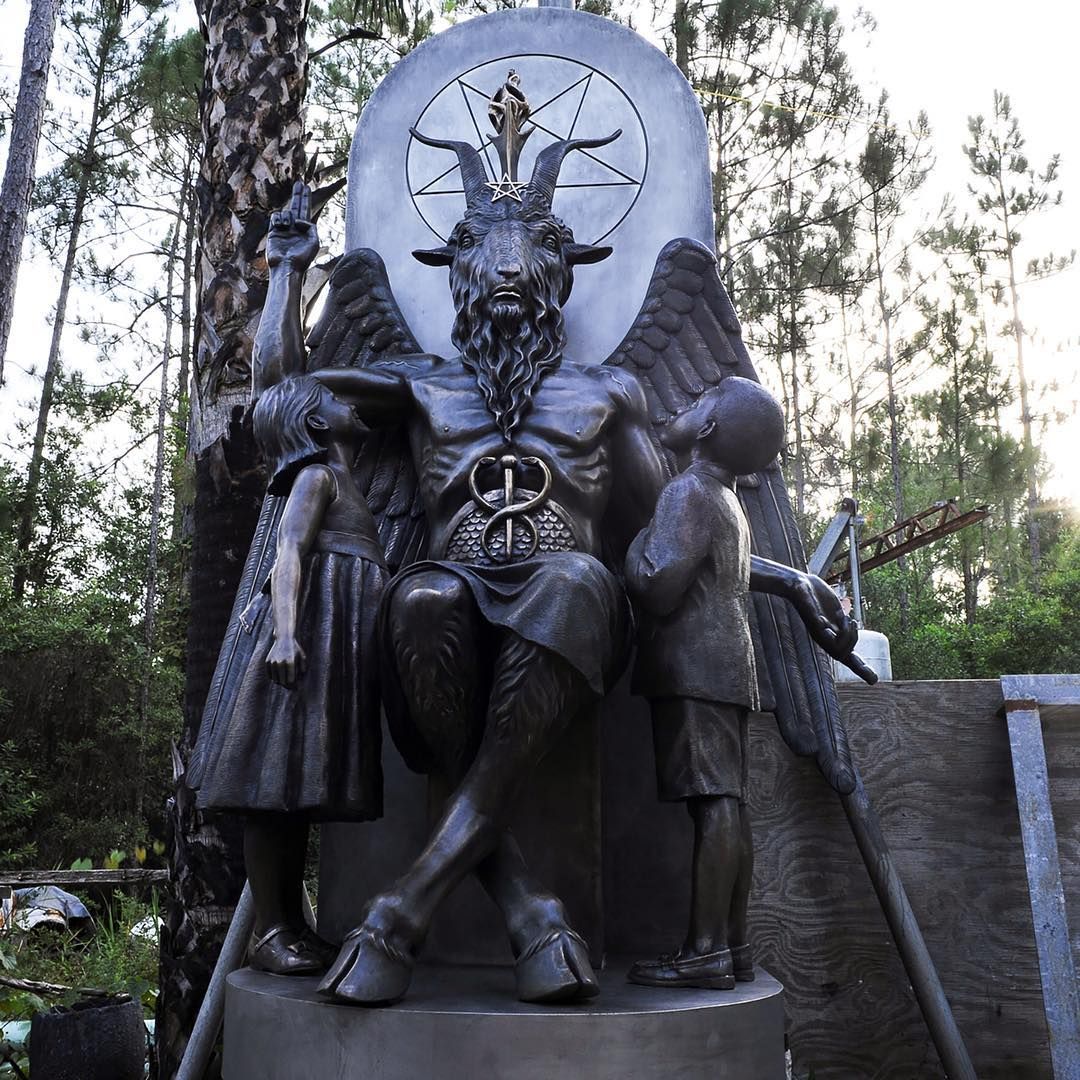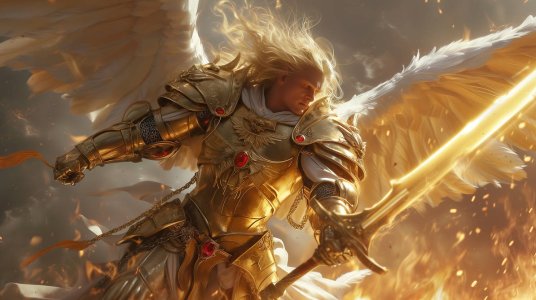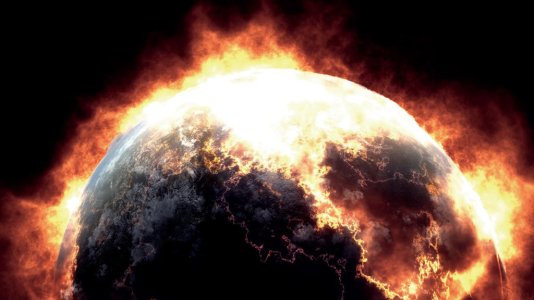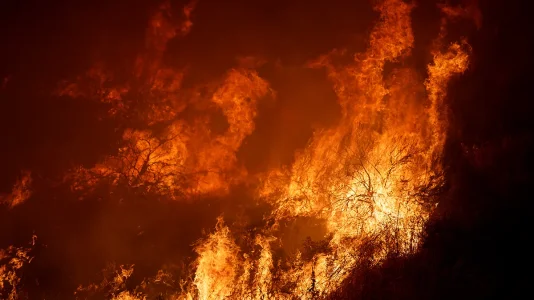- Mar 5, 2024
- 2,141
- 1,103
Earthly Prosperity, And The Sandstorm That Is Now Approaching
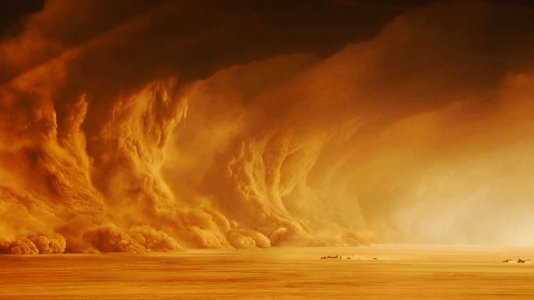
There were two types of "prosperity" the New Testament saints were pursuing. The first was a faith tried like gold in the fires of trials and sufferings. The Lord Himself encouraged the church at Smyrna to seek it, and He was was talking about the same thing we discussed in the first two studies; a faith that endured even the persecutions the Devil was subjecting them to, especially through unbelieving Jews. If they endured what was coming, they would receive "the crown of life" the Lord promised to those who finished their race:
And to the angel of the church in Smyrna, write, "These things say the First and the Last, the One who was dead, yet lived. I know your affliction and poverty, yet you are rich. And [I know] the blasphemy coming from those who declare themselves to be Jews, yet are not, but are of the synagogue of Satan. Do not fear the things which you are about to suffer. Behold, the Devil is about to cast some of you into prison, that you may be put through trials, and you will suffer affliction for ten days. Be faithful unto death, and I will give to you the crown of life." (Revelations 2:8-10)
New Testament saints needed to pursue understanding from God's word as well, for as we shall see it was another form of spiritual "riches" they were to be seeking. But the temptation within Judaism was to pursue earthly prosperity instead, and this mentality was now creeping back into the church. So James was now warning them that a storm was coming, which would soon sweep away the material riches of the world, so believers needed to be seeking what would last. A "rich" man's status in this life was only temporary, and only what would endure the test of time would remain:
But let the lowly brother boast in his exalted status, yet the rich [man] in his lowly status, for like the flower of the grass he shall pass away. For the sun arose with the scorching wind and withered the grass, and its flower fell out, and the beauty of its appearance perished. So also shall the rich man die away in the midst of his travels. "Blessed" is the man who endures trials, for after he has been proven he shall receive the crown of life which the Lord promised to those who love Him. (James 1:9-12)
James lifted the verses in this passage from the Book of Isaiah, where the prophet once spoke about the great and fearful Day of the Lord that was coming, and how princes and kings - the rich of this world - would eventually wither like flowers in the heat of His wrath. Those left standing would be those who had faithfully endured until the end in serving Him:
A voice cries in the wilderness, "Prepare the way of the Lord. Make straight in the desert a highway for our God. Every valley shall be lifted up, and every mountain and hill shall be brought low... And the glory of the Lord shall be revealed, and all flesh shall see it together, for the mouth of the Lord has spoken.” A voice said, “Cry!” And I said, “What shall I cry?" "All flesh is grass, and all its beauty is like the flower of the field. The grass withers [and] the flower fades when the breath of the Lord blows upon it. Surely the people are grass. The grass withers, the flower fades, but the word of our God endures forever"... Behold, the Lord God comes with might, and His arm rules for Him. Behold, His reward is with Him, and His recompense before Him. He will tend His flock like a shepherd… [but He] brings princes to nothing, and makes the rulers of the earth as a desert wasteland. Scarcely are they planted, scarcely sown, scarcely has their stem taken root in the earth, when He blows upon them and they wither, and the storm carries them off like stubble. (Isaiah 40:3-8, 10-11, 22-24)
That every "valley and mountain would be brought low" was a reference to the fall of earthly kingdoms, whereas valley being "lifted up" was a reference to the church, i.e. the kingdom of God, which would assume rulership over the earth at His second coming. Thus, His return would be like a storm, and it would reveal all flesh to be as grass and stubble.
The analogy both Isaiah and James were using here was of a phenomenon in the Mediterranean world called a Sirocco, or desert sandstorm:
Sirocco is a Mediterranean wind that comes from the Sahara and can reach hurricane speeds in North Africa and Southern Europe, especially during the summer season... The dust within the sirocco winds can cause abrasion in mechanical devices and penetrate buildings. Sirocco winds with speeds of up to 100 km/h (62 mph; 54 kn) are most common during autumn and spring. They reach a peak in March and in November when it is very hot. (Wikipedia, Sirocco)
This was the "scorching wind" James was referring to, for siroccos are still common in regions like Palestine and Iraq to this day, and known to destroy crops and cause significant damage to all plant life, including the grass. Thus James was warning that the Lord's return would have this effect on the rich, and not to pursue wealth instead of righteousness. Like all the New Testament writers, he believed Christ's return was imminent, so the time had come to pursue spiritual riches instead. By letter's end, the warnings will be giving about this will become increasingly clear:
Come now, you rich men, weep and howl for the miseries that are coming upon you! 2 Your riches are corrupted, and your garments are moth-eaten. 3 Your gold and silver are corroded, and their corrosion will be a witness against you, and will eat your flesh like fire... 7 Be patient, therefore, brethren... for the coming of the Lord is at hand. (James 5:1-3, 7)
Worst of all, the pursuit of earthly wealth can actually hinder and interfere with one's ability to pursue spiritual wealth, which is why the Lord Himself taught about the impossibility of serving both God and money.
The Futility Of Serving Two Masters
Though Christ's return would not come in their lifetime, Christians in the early church would nevertheless live to see the conquest of Jerusalem at the hands of the Romans, and the destruction of the Jewish temple just as Jesus had prophesied (Matthew 24:1-2). God's judgment finally came against them, and the treasures of the Temple were carted back to Rome as trophies of war. Rich Jews who had invested their lives in accumulating wealth lost everything when their property was confiscated and subsumed by the Roman army.
This is part of why the Lord taught to seek spiritual treasures, and why giving oneself to seeking material wealth instead is such a terrible mistake. There was no way to do both, for it was like trying to serve two masters, and in such situations only one could truly be served:
24 No one can serve two masters, for either he will hate the one and love the other, or else he will be loyal to the one and despise the other. You cannot serve both God and mammon. 25 Therefore I say to you, do not worry about your life, what you will eat or what you will drink; nor about your body, what you will put on. Is not life more than food and the body more than clothing?... 31 “Therefore do not worry, saying, ‘What shall we eat?’ or ‘What shall we drink?’ or ‘What shall we wear?’ 32 For after all these things the Gentiles seek. For your heavenly Father knows that you need all these things. 33 But seek first the kingdom of God and His righteousness, and all these things shall be added to you. 34 Therefore do not worry about tomorrow, for tomorrow will worry about its own things. Sufficient for the day is its own trouble. (Matthew 6:25-34)
There was to be a continual growth in the knowledge of God, so that the spiritually rich became even richer, while those who chose to remain spiritually poor would become even poorer. Jesus taught this principle as well, warning about the spiritual "haves and have nots" as it were, and that those who had would gain even more, but those who had not would eventually lose even what little they had:
And the disciples came and said to Him, “Why do You speak to them in parables?” He answered and said to them, “Because it has been given to you to know the mysteries of the kingdom of heaven, but to them it has not been given. For whoever has, to him more will be given, and he will have abundance; but whoever does not have, even what he has will be taken away from him. Therefore I speak to them in parables, because seeing they do not see, and hearing they do not hear, nor do they understand. (Matthew 13:10-13)
Continued next post...

There were two types of "prosperity" the New Testament saints were pursuing. The first was a faith tried like gold in the fires of trials and sufferings. The Lord Himself encouraged the church at Smyrna to seek it, and He was was talking about the same thing we discussed in the first two studies; a faith that endured even the persecutions the Devil was subjecting them to, especially through unbelieving Jews. If they endured what was coming, they would receive "the crown of life" the Lord promised to those who finished their race:
And to the angel of the church in Smyrna, write, "These things say the First and the Last, the One who was dead, yet lived. I know your affliction and poverty, yet you are rich. And [I know] the blasphemy coming from those who declare themselves to be Jews, yet are not, but are of the synagogue of Satan. Do not fear the things which you are about to suffer. Behold, the Devil is about to cast some of you into prison, that you may be put through trials, and you will suffer affliction for ten days. Be faithful unto death, and I will give to you the crown of life." (Revelations 2:8-10)
New Testament saints needed to pursue understanding from God's word as well, for as we shall see it was another form of spiritual "riches" they were to be seeking. But the temptation within Judaism was to pursue earthly prosperity instead, and this mentality was now creeping back into the church. So James was now warning them that a storm was coming, which would soon sweep away the material riches of the world, so believers needed to be seeking what would last. A "rich" man's status in this life was only temporary, and only what would endure the test of time would remain:
But let the lowly brother boast in his exalted status, yet the rich [man] in his lowly status, for like the flower of the grass he shall pass away. For the sun arose with the scorching wind and withered the grass, and its flower fell out, and the beauty of its appearance perished. So also shall the rich man die away in the midst of his travels. "Blessed" is the man who endures trials, for after he has been proven he shall receive the crown of life which the Lord promised to those who love Him. (James 1:9-12)
James lifted the verses in this passage from the Book of Isaiah, where the prophet once spoke about the great and fearful Day of the Lord that was coming, and how princes and kings - the rich of this world - would eventually wither like flowers in the heat of His wrath. Those left standing would be those who had faithfully endured until the end in serving Him:
A voice cries in the wilderness, "Prepare the way of the Lord. Make straight in the desert a highway for our God. Every valley shall be lifted up, and every mountain and hill shall be brought low... And the glory of the Lord shall be revealed, and all flesh shall see it together, for the mouth of the Lord has spoken.” A voice said, “Cry!” And I said, “What shall I cry?" "All flesh is grass, and all its beauty is like the flower of the field. The grass withers [and] the flower fades when the breath of the Lord blows upon it. Surely the people are grass. The grass withers, the flower fades, but the word of our God endures forever"... Behold, the Lord God comes with might, and His arm rules for Him. Behold, His reward is with Him, and His recompense before Him. He will tend His flock like a shepherd… [but He] brings princes to nothing, and makes the rulers of the earth as a desert wasteland. Scarcely are they planted, scarcely sown, scarcely has their stem taken root in the earth, when He blows upon them and they wither, and the storm carries them off like stubble. (Isaiah 40:3-8, 10-11, 22-24)
That every "valley and mountain would be brought low" was a reference to the fall of earthly kingdoms, whereas valley being "lifted up" was a reference to the church, i.e. the kingdom of God, which would assume rulership over the earth at His second coming. Thus, His return would be like a storm, and it would reveal all flesh to be as grass and stubble.
The analogy both Isaiah and James were using here was of a phenomenon in the Mediterranean world called a Sirocco, or desert sandstorm:
Sirocco is a Mediterranean wind that comes from the Sahara and can reach hurricane speeds in North Africa and Southern Europe, especially during the summer season... The dust within the sirocco winds can cause abrasion in mechanical devices and penetrate buildings. Sirocco winds with speeds of up to 100 km/h (62 mph; 54 kn) are most common during autumn and spring. They reach a peak in March and in November when it is very hot. (Wikipedia, Sirocco)
This was the "scorching wind" James was referring to, for siroccos are still common in regions like Palestine and Iraq to this day, and known to destroy crops and cause significant damage to all plant life, including the grass. Thus James was warning that the Lord's return would have this effect on the rich, and not to pursue wealth instead of righteousness. Like all the New Testament writers, he believed Christ's return was imminent, so the time had come to pursue spiritual riches instead. By letter's end, the warnings will be giving about this will become increasingly clear:
Come now, you rich men, weep and howl for the miseries that are coming upon you! 2 Your riches are corrupted, and your garments are moth-eaten. 3 Your gold and silver are corroded, and their corrosion will be a witness against you, and will eat your flesh like fire... 7 Be patient, therefore, brethren... for the coming of the Lord is at hand. (James 5:1-3, 7)
Worst of all, the pursuit of earthly wealth can actually hinder and interfere with one's ability to pursue spiritual wealth, which is why the Lord Himself taught about the impossibility of serving both God and money.
The Futility Of Serving Two Masters
Though Christ's return would not come in their lifetime, Christians in the early church would nevertheless live to see the conquest of Jerusalem at the hands of the Romans, and the destruction of the Jewish temple just as Jesus had prophesied (Matthew 24:1-2). God's judgment finally came against them, and the treasures of the Temple were carted back to Rome as trophies of war. Rich Jews who had invested their lives in accumulating wealth lost everything when their property was confiscated and subsumed by the Roman army.
This is part of why the Lord taught to seek spiritual treasures, and why giving oneself to seeking material wealth instead is such a terrible mistake. There was no way to do both, for it was like trying to serve two masters, and in such situations only one could truly be served:
24 No one can serve two masters, for either he will hate the one and love the other, or else he will be loyal to the one and despise the other. You cannot serve both God and mammon. 25 Therefore I say to you, do not worry about your life, what you will eat or what you will drink; nor about your body, what you will put on. Is not life more than food and the body more than clothing?... 31 “Therefore do not worry, saying, ‘What shall we eat?’ or ‘What shall we drink?’ or ‘What shall we wear?’ 32 For after all these things the Gentiles seek. For your heavenly Father knows that you need all these things. 33 But seek first the kingdom of God and His righteousness, and all these things shall be added to you. 34 Therefore do not worry about tomorrow, for tomorrow will worry about its own things. Sufficient for the day is its own trouble. (Matthew 6:25-34)
There was to be a continual growth in the knowledge of God, so that the spiritually rich became even richer, while those who chose to remain spiritually poor would become even poorer. Jesus taught this principle as well, warning about the spiritual "haves and have nots" as it were, and that those who had would gain even more, but those who had not would eventually lose even what little they had:
And the disciples came and said to Him, “Why do You speak to them in parables?” He answered and said to them, “Because it has been given to you to know the mysteries of the kingdom of heaven, but to them it has not been given. For whoever has, to him more will be given, and he will have abundance; but whoever does not have, even what he has will be taken away from him. Therefore I speak to them in parables, because seeing they do not see, and hearing they do not hear, nor do they understand. (Matthew 13:10-13)
Continued next post...




